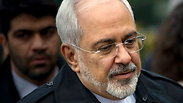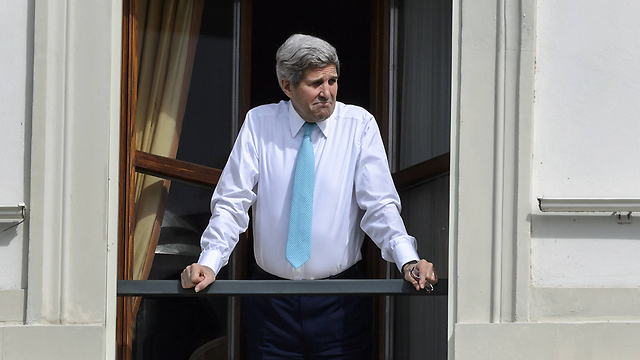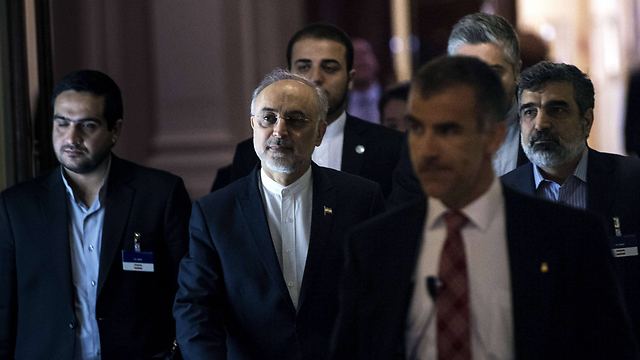
Iranian Foreign Minister Zarif
צילום: רויטרס
After missing deadline, Iran nuclear talks stumble
German foreign minister says negotiations face 'tough struggle' while Tehran's top diplomat warns progress depends on 'political will of world powers'.
Negotiations over Iran's nuclear program dragged on Wednesday, beset by competing claims after diplomats abandoned a March 31 deadline for the outline of a deal and agreed to press on.
German Foreign Minister Frank-Walter Steinmeier said negotiators were still facing a "tough struggle," indicating the talks were not likely to end anytime soon, with other officials expecting the negotiations, already extended into Wednesday, to continue into Thursday.
Iran and six powers have been locked in haggling over what an initial understanding should look like for nearly a week, reflecting the significant gaps facing them.
Steinmeier said he hoped that when the talks end "we won't just be reporting about closing gaps" but also will be providing details of agreement on important points. His comment reflected unhappiness with Iran's insistence that the Lausanne talks should end only with a vague statement of principles.
The German said he held out hope that the sides would be able to negotiate a preliminary accord that will let them embark on a new phase of talks aiming for a final deal by June.
Meanwhile, Iran's Foreign Minister Mohammad Javad Zarif said on Wednesday that the nuclear talks with the success major powers could succeed if they have political will to resolve Iran's 12-year old nuclear standoff.
"Progress and success of the talks depends on the political will of the other party ... and this is an issue they have always had a problem with," said Tehran's chief delegate in the Swiss city of Lausanne, where the talks are set to enter an eighth day.
Earlier, Iran's deputy foreign minister, Abbas Araghchi, told reporters that if the sides make progress on the text of a joint statement, then that could be issued by the end of Wednesday. But he suggested the statement would contain no specifics.
A senior Western official quickly pushed back, saying that nothing about a statement had been decided and that Iran's negotiating partners would not accept a document that contained no details. The official was not authorized to speak to the negotiations by name and spoke on condition of anonymity.
Araghchi named differences on sanctions relief on his country as one dispute, along with disputes on Iran's uranium enrichment-related research and development.
"Definitely our research and development program on high-end centrifuges should continue," he told Iranian television.
The US and its negotiating partners want to crimp Iranian efforts to improve the performance of centrifuges that enrich uranium because advancing the technology could let Iran produce material that could be used to arm a nuclear weapon much more quickly than at present.
The exchanges reflected significant gaps between the sides, and came shortly after the end of the first post-deadline meeting between US Secretary of State John Kerry, his British and German counterparts and Zarif. They and their teams were continuing a marathon effort to bridge still significant gaps and hammer out a framework accord.
Eager to avoid a collapse in the discussions, the United States and others claimed late Tuesday that enough progress had been made to warrant an extension after six days of intense bartering. The foreign ministers of China, France and Russia all departed Lausanne overnight, although the significance of their absence was not clear.
Zarif said solutions to many of the problems had been found and documents attesting to that would soon be drafted. Russian Foreign Minister Sergey Lavrov said before leaving that the negotiators had reached agreement in principle on all key issues, and in the coming hours it would be put on paper.
Others were more skeptical.
British Foreign Secretary Philip Hammond said Iran might still not be ready to accept what is on the table.
Officials say the intention is to produce a joint statement outlining general political commitments to resolving concerns about Iran's nuclear program in exchange for sanctions relief. In addition, they are trying to fashion other documents that would lay out in more detail the steps they must take by June 30 to meet those goals.
The additional documents would allow the sides to make the case that the next round of talks will not simply be a continuation of negotiations that have already been twice extended since an interim agreement between Iran, the United States, Russia, China, Britain, France and Germany was concluded in November 2013. President Barack Obama and other leaders, including Iran's, have said they are not interested in a third extension.
But if the parties agree only to a broad framework that leaves key details unresolved, Obama can expect stiff opposition at home from members of Congress who want to move forward with new, stiffer Iran sanctions. Lawmakers had agreed to hold off on such a measure through March while the parties negotiated. The White House says new sanctions would scuttle further diplomatic efforts to contain Iran's nuclear work and possibly lead Israel to act on threats to use military force to accomplish that goal.
Prime Minister Benjamin Netanyahu, who has campaigned tirelessly for months against the emerging agreement, said it would "ensure a bad deal that would endanger Israel, the Middle East and the peace of the world."
"A better deal would significantly roll back Iran's nuclear infrastructure. A better deal would link the eventual lifting of the restrictions on Iran's nuclear program to a change in Iran's behavior," he said.
Reuters and the Associated Press contributed to this report.












